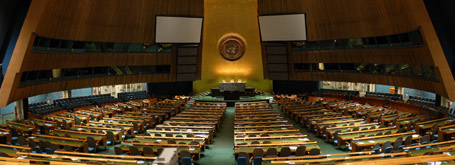The Associated Press has quoted sources to say that the US will support a UN declaration calling for the worldwide decriminalisation of homosexuality. Some 75 countries outlaw same-sex relations and at least six countries impose the death penalty.
It was reported that the declaration will be endorsed by the Obama administration, a 180-degree turn from former President George W. Bush's refusal to sign last December.
Last year, the UN General Assembly heard two statements on LGBTI rights, one in favour, the other opposing. At the time, 66 states including all 27 members of the European Union, Australia, Japan, Nepal and New Zealand supported the statement while 57 states including the Holy see and members of the Organization of the Islamic Conference opposed the declaration.
The groundbreaking however nonbinding declaration was co-sponsored by the Netherlands and France with Argentina making the actual statement in the General Assembly.
In a column for Fridae, Douglas Sanders - a Canadian law professor and prominent academic on the on-going effects of Section 377, an often encountered law which prohibits same-sex relations in former British colonies - noted that "Asia, unfortunately, was something of a disaster" with regards to the declaration.
"No member of the Association of Southeast Asian Nations supported the statement. Thai activists met with the Foreign Ministry and with the Chair of the National Commission on Human Rights and collected signatures on a petition. A group of organisations petitioned the government of China. Both countries abstained - maybe they were out having coffee together when the statement was read."
Supporting the Argentinian statement were:
Albania, Andorra, Argentina, Armenia, Australia, Austria, Belgium, Bolivia, Bosnia and Herzegovina, Brazil, Bulgaria, Canada, Capte Verde, Central African Republic, Chile, Colombia, Croatia, Cuba, Cyprus, Czech Republic, Denmark, Ecuador, Estonia, Finland, France, Gabon, Georgia, Germany, Greece, Guinea-Bissau, Hungary, Iceland, Ireland, Israel, Italy, Japan, Latvia, Liechtenstein, Lithuania, Luxembourg, Malta, Mauritius, Mexico, Montenegro, Nepal, Netherlands, New Zealand, Nicaragua, Norway, Paraguay, Poland, Portugal, Romania, San Marino, Sao Tomo and Principe, Serbia, Slovakia, Slovenia, Spain, Sweden, Switzerland, the former Yugoslave Republic of Macedonia, Timor-Leste, United Kingdom, Uruguay and Venezuela.
Supporting the Syrian statement were:
Afghanistan, Algeria, Bahrain, Bangladesh, Benin, Brunei, Cameroon, Chad, Comoros, Cote d'Ivoire, DPR Korea, Dijbouti, Egypt, Eritrea, Ethiopia, Fiji, Gambia, Guinea, Indonesia, Iran, Iraq, Jordan, Kazakhstan, Kenya, Kuwait, Lebanon, Libya, Malawi, Malaysia, Maldives, Mali, Mauritania, Morocco, Niger, Nigeria, Oman, Pakistan, Qatar, Rwanda, Saint Lucia, Saudi Arabia, Senegal, Sierra Leone, Solomon Islands, Somalia, Sudan, Swaziland, Syria, Tajikistan, Togo, Tunisia, Turkmenistan, Uganda, United Arab Emirates, United Republic of Tanzania, Yemen, and Zimbabwe.
The rest of the 192 members either abstained or were absent.

18 Mar 2009
US to sign UN declaration calling for worldwide decriminalisation of gay sex
The US is expected to sign the UN gay rights declaration sponsored by France and the Netherlands last year - making it the last Western nation to do so, says report.
